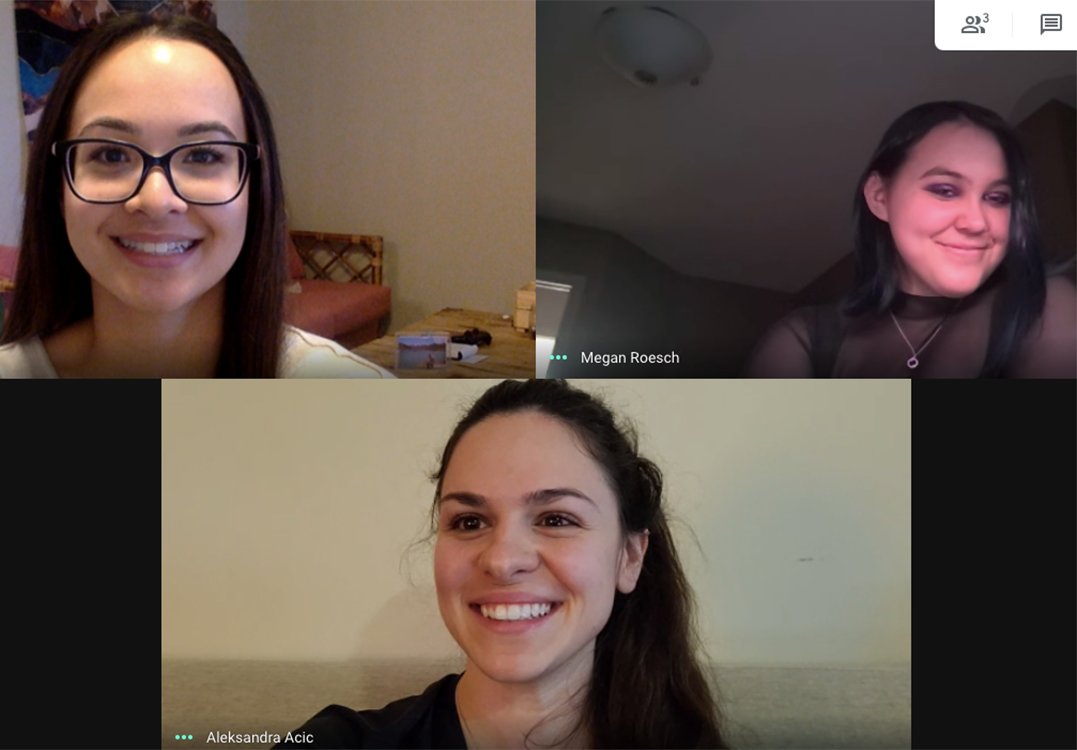Lexi Acic, Kaitlyn Molo, Megan Roesch
Lexi: Bachelor of Arts (Native Studies)/Bachelor of Education (Elementary), 4th Year
Kaitlyn: Bachelor of Education (Elementary), 4th Year
Megan: Bachelor of Arts, Criminology, 1st Year
Course: CSL 100 (Winter 2021) with Instructor Randi Nixon
Who was your community partner and can you describe the project objectives?
As students in the U of A's Community Service-Learning (CSL) program, we see first-hand the challenges charities face in fundraising to achieve their missions - especially with in-person fundraising events indefinitely on hold. The 24-Hour Fast for Leftovers is an online, peer-to-peer fundraiser for the Leftovers Foundation, to help grow and sustain their operations in Edmonton and across Western Canada. We are raising money for Leftovers because we believe in their innovative, community-first approach to reducing waste and increasing access, and want to apply our CSL learnings in a real-world context. Please join us by donating, sharing our campaign, and pledging to participate! Together, we can reduce waste, increase access, and build a stronger community for all.
What was your biggest takeaway from your CSL placement?
Megan: The biggest takeaway is learning how to work well and efficiently with others, and how to have effective time management skills. While working in my placement we only have a group of three people to plan and organize an entire fundraiser, not only is it stressful but it's also a great experience for me to learn.
Lexi: My biggest takeaway from my placement with Leftovers is the ability to work as a team. Prior to my current placement, I have had the opportunity through CSL to be a part of various different organizations, however, they were solo ventures. It has been refreshing to have allies that I can bounce ideas off of and work together to create an event that will provide me with the foundations of organizing and hosting future fundraisers and events.
Kaitlyn: Collaborating with a community of leaders has encouraged me to continue to engage in lifelong service-learning. Navigating the intricacies of ‘being’ as a community, provides belonging in a space where actions for social change can be sustainably developed. Coming together with our own experiences and expertise created a strong foundation throughout the placement. My takeaway is the importance of fostering effective connections within communities for a more just tomorrow.
How can you apply any newly gained knowledge/skills to your future endeavours (courses/employment/volunteering)?
Lexi: I have gained valuable skills during my placement with Leftovers Foundation such as time management, communication, networking, marketing, planning, outreach, organization, and relationship building. My placement really encourages me to seek sponsors for our fundraising event and it can really be nerve-racking! This requires communication with/through myself, my group members, and my CSL partner. It has led me to seek new networking opportunities and opens the door for a relationship with the various members and organizations that I come in contact with. Another aspect of my partnership is taking part in the delivery routes as you get to know the communities you come into contact with a little better after each interaction.
Megan: I learned how to work well with others, how to communicate efficiently, and how to keep an organized schedule. With these newly developed skills, I will be able to apply them to my daily life especially regarding my future university classes and future career. It also will add an advantage for me to be able to work well closely with others under a high stress environment, as through my placement those conditions were similar.
Kaitlyn: During my experience in CSL, I was able to connect several learning outcomes to my future career in education. My hope is to develop a learning environment that incorporates student’s connections with their communities to engage them with service-learning. Engaging with the community has provided me with many learning moments that will support me in continuing to spark social change with a collaborative approach.
What are some of the ways that COVID-19 has affected your community partner or your placement?
Given COVID-19 restrictions, our placement has taken place virtually through weekly meetings. While this has not been ideal, we have been able to create a sense of community to approach planning the fundraising event. We have had prior experience participating in fundraising events, but have never taken on a leadership role. This was daunting at first as we had to navigate the challenges surrounding the digital platform of the event. However, we are hopeful about being able to connect with the University community to gain interest.
Leftovers Foundation is committed to reducing food waste and increasing food access in our community. COVID-19 presented significant changes to the frequency and volume of donations. Due to the challenges faced by so many members of the community, Leftovers has seen an unprecedented need for access to food. Many volunteers are required to take on food donation routes, so Leftovers has to ensure heightened needs for safety are met through guidelines.
